A Look At The Growing Market Landscape For Monoclonal Antibodies
By Raj Shah and Kamrul Hasan, Coherent Market Insights
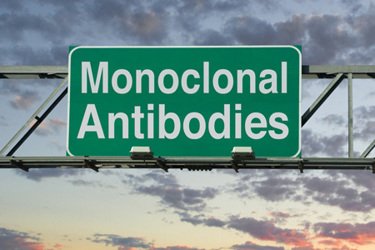
Monoclonal antibodies (mAbs) are produced by cloning a single immune cell called a hybridoma, which produces a specific antibody. This process involves fusing an antibody-producing B cell with a myeloma cell to create a hybridoma cell line capable of producing identical antibodies. These hybridomas can be cultured indefinitely, ensuring a stable supply of consistent antibodies.
One of the key advantages of monoclonal antibodies is their high specificity for the target molecule. Through careful design and selection, mAbs can be engineered to bind to a specific antigen or receptor, enabling precise targeting of disease-causing agents such as cancer cells or pathogenic proteins. This specificity minimizes off-target effects and enhances the therapeutic efficacy of mAbs. Owing to this advantage, mAbs have emerged as a revolutionary class of therapeutic agents with the potential to treat various diseases.
According to new market research by Coherent Market Insights, the global monoclonal antibodies market is estimated to be valued at $205.4 billion in 2023 and is expected to exhibit a CAGR of 12.7% during the forecast period (2023-2031), rising to $533.6 billion in 2031.
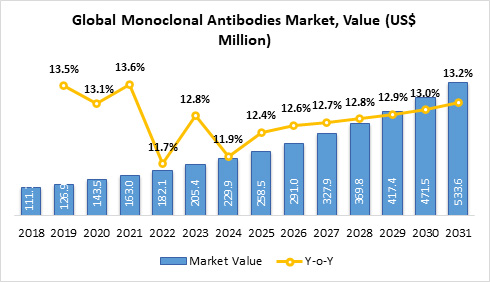
Monoclonal antibodies find applications in various therapeutic areas. They are used to treat cancer, autoimmune disorders, infectious diseases, and inflammatory conditions, and products include trastuzumab (Herceptin) for breast cancer, rituximab (Rituxan) for lymphoma, and infliximab (Remicade) for inflammatory bowel diseases.
Moreover, some monoclonal antibodies function by stimulating or suppressing the immune system. Immune checkpoint inhibitors, such as pembrolizumab (Keytruda) and nivolumab (Opdivo), enhance the body's immune response against cancer cells. On the other hand, mAbs like adalimumab (Humira) target and neutralize specific immune proteins involved in autoimmune diseases.
Cancer, also called malignancy, refers to abnormal cell growth. Monoclonal antibodies are increasingly preferred as an efficient therapy for cancer treatment worldwide. Therefore, various pharmaceutical companies, biotech companies, universities, and cancer centers are focusing on investing in the development of novel monoclonal antibodies. According to the analysis of Coherent Market Insights, 59 monoclonal antibodies are currently approved by the FDA for different cancer therapies, including for the treatment of lymphoma, multiple myeloma, breast cancer, lung cancer, and sarcoma. The increasing prevalence of cancer is projected to increase the demand for monoclonal antibodies as they aid in the treatment of this disease.
The graph below represents the therapeutic area market share of the global monoclonal antibodies market in 2022 (Coherent Market Insights analysis).
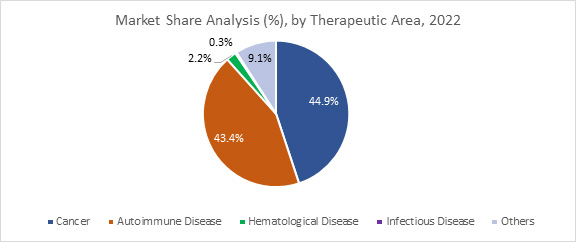
In 2022 alone, the FDA approved 16 therapeutic antibodies, as shown in the table below.

The table below represents commercially sponsored investigational monoclonal antibodies for different cancers (indications for which a regulatory submission is anticipated).
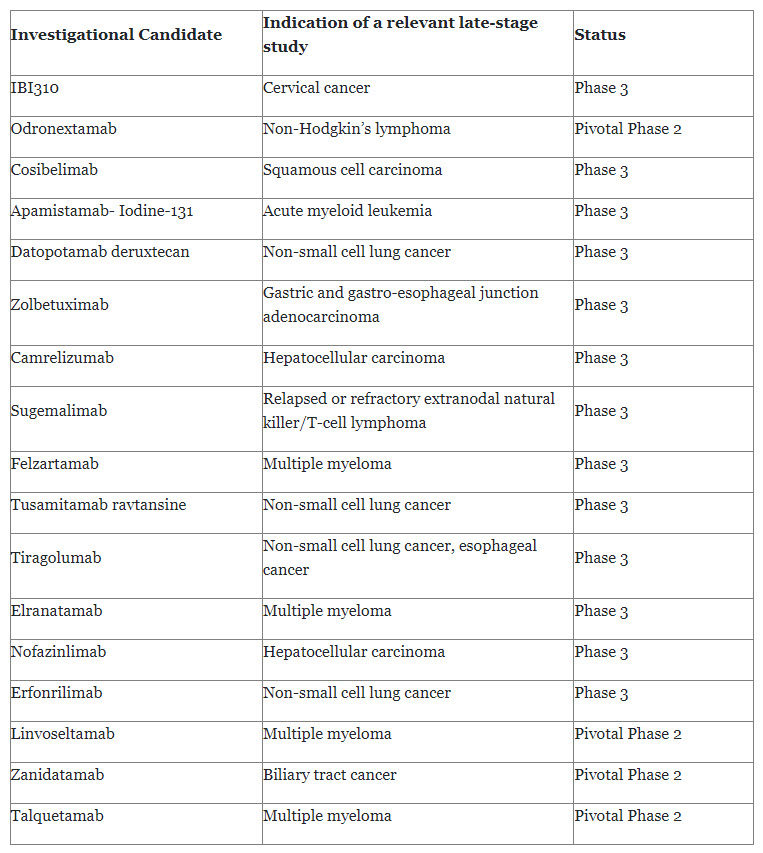
Market players are also investigating monoclonal antibodies for non-oncology indications. Commercially sponsored investigational monoclonal antibodies for non-oncology indications are shown below.
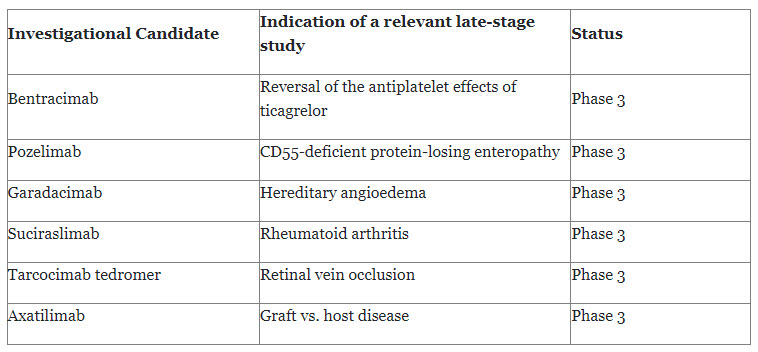
According to Coherent Market Insights’ analysis, several monoclonal antibodies have achieved blockbuster status, generating significant sales for pharmaceutical companies. The table below represents top-selling monoclonal antibody drugs in 2022.
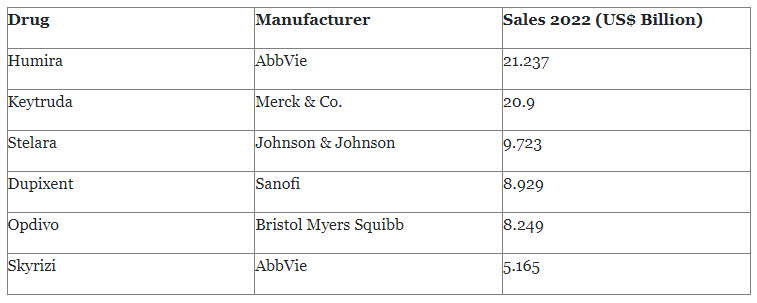
The major market players in the global monoclonal antibodies market include Merck & Co., AbbVie, Pfizer, Novartis International, Bayer, Sanofi, F. Hoffmann-La Roche, Eli Lilly and Company, GlaxoSmithKline, Bristol-Myers Squibb, and Regeneron Pharmaceuticals.
Market Restraints For Innovators Are Market Opportunities For Biosimilar Developers
Although the monoclonal antibodies market growth has been lucrative over the last five years, factors such as high costs associated with monoclonal antibody therapies restrict their adoption by low- and middle-income groups, thus hampering the market growth. For instance, Keytruda (pembrolizumab), a monoclonal antibody used for the treatment of various cancer types, costs around $2,250 for a 50-mg vial. Similarly, Bavencio (manufactured by Pfizer and Merck) immunotherapy costs around $13,000 a month. The high cost of biopharmaceutical products is a major issue (in regions with underdeveloped reimbursement) in the healthcare system. Therefore, to address this problem, manufacturers have resorted to the development of biosimilar products.
Biosimilars cost much less than the original products as the cost of development is relatively low. The majority of the available monoclonal antibody therapeutics, such as Humira, Keytruda, Stelara, and others (cancer treatments) are expected to lose patent protection after 2020.
Several manufacturers have biosimilars for existing monoclonal antibodies in the pipeline. For instance, the Singapore-based Prestige Biopharma has HD204 (Avastin biosimilar) in Phase 3 for solid tumors and PBP1502 (Humira biosimilar) in Phase 1 for rheumatoid arthritis.
Conclusion
Monoclonal antibodies have revolutionized the field of therapeutics, offering targeted treatments for various diseases. Major factors driving the growth of the global monoclonal antibodies market include the high prevalence of chronic diseases such as cancer, increasing product approvals by regulatory authorities, and a rising focus of market players on developing new monoclonal antibodies. With continued research and development, monoclonal antibodies are expected to shape the future of the healthcare sector, thus improving patient outcomes and transforming the treatment landscape. While the high cost of these antibodies is hindering market growth, the development of low-cost biosimilars is expected to help the market players expand their customer base in low- and middle-income populations.
About The Authors:
Raj Shah is founder and CEO of management consulting company Coherent Market Insights, which is headquartered in India with a virtual office in the U.S. and consultants also located in the U.K. and Japan. He is a business accelerator with global experience and focuses on healthcare tech, consumer electronics, telecom, and fintech.
Kamrul Hasan has been working at Coherent Market Insights for six years. A few of his expertise areas include operations, market research and analysis, project management, market entry, and business intelligence. He has executed more than 100 consulting projects in the field of medical devices and pharmaceuticals.
